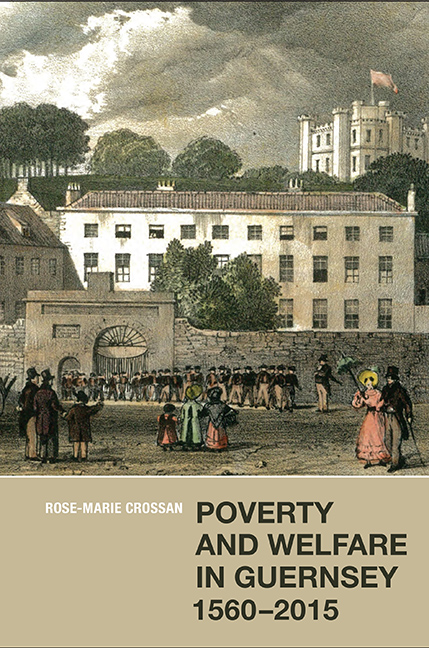Book contents
- Frontmatter
- Dedication
- Contents
- List of Illustrations
- Acknowledgements
- Abbreviations
- Conventions, Note on curren
- Maps
- Introduction
- I Context
- II Welfare
- III Town Hospital
- IV Twentieth Century and Beyond
- Conclusion
- Appendix 1 Writings on Peasant Proprietorship in Guernsey
- Appendix 2 Poor Rates, Indoor and Outdoor Relief Spending, St Peter Port, 1724–1924
- Appendix 3 Parochial Poor Relief in Other Channel Islands
- Appendix 4 Average Year-end Head-counts and Average Annual Admissions and Discharges, Town Hospital, 1700s–1900s
- Appendix 5 Adult Admissions Ascribed to Illness and Accidents, Town Hospital, 1852–1919
- Appendix 6 Relative Proportions of Men and Women in Year-end Head-counts and Annual Admissions, Town Hospital, 1750–1919
- Appendix 7 Annual Averages of Child Admissions and Year-end Numbers, Town Hospital, 1756–1919
- Appendix 8 Over-60s as a Proportion of all Inmates, and Composition by Sex of Over-60s Cohort, Town Hospital, 1756–1911
- Appendix 9 Average Weekly Amounts Purchased per Head, Town Hospital, 1760–1917
- Appendix 10 Timeline: Developments in Poor Relief and Social Security, 1700–2010
- Bibliography
- Index
5 - Self-Help and Voluntary Charity
Published online by Cambridge University Press: 18 June 2021
- Frontmatter
- Dedication
- Contents
- List of Illustrations
- Acknowledgements
- Abbreviations
- Conventions, Note on curren
- Maps
- Introduction
- I Context
- II Welfare
- III Town Hospital
- IV Twentieth Century and Beyond
- Conclusion
- Appendix 1 Writings on Peasant Proprietorship in Guernsey
- Appendix 2 Poor Rates, Indoor and Outdoor Relief Spending, St Peter Port, 1724–1924
- Appendix 3 Parochial Poor Relief in Other Channel Islands
- Appendix 4 Average Year-end Head-counts and Average Annual Admissions and Discharges, Town Hospital, 1700s–1900s
- Appendix 5 Adult Admissions Ascribed to Illness and Accidents, Town Hospital, 1852–1919
- Appendix 6 Relative Proportions of Men and Women in Year-end Head-counts and Annual Admissions, Town Hospital, 1750–1919
- Appendix 7 Annual Averages of Child Admissions and Year-end Numbers, Town Hospital, 1756–1919
- Appendix 8 Over-60s as a Proportion of all Inmates, and Composition by Sex of Over-60s Cohort, Town Hospital, 1756–1911
- Appendix 9 Average Weekly Amounts Purchased per Head, Town Hospital, 1760–1917
- Appendix 10 Timeline: Developments in Poor Relief and Social Security, 1700–2010
- Bibliography
- Index
Summary
The historian Olwen Hufton coined the term ‘economy of makeshifts’, using it to describe the way in which the poor of eighteenth-century France assembled a living from a variety of disparate sources. For Guernsey's poor, rural and urban alike, such a ‘composite’ living was always a necessity. Many of the rural poor had some scrap of land, but this seldom met a family's needs, and other expedients – fishing, labouring, working at a trade or craft – were indispensable. All household members played their part, with wives hawking produce, younger children sent weeding or bird-scaring, older girls put into service and boys sent out to labour on farms or in quarries. For poor urban families – who owned no land – the family economy was even more vital. If the household head worked at an unskilled occupation such as carting, portering, stone-cracking or general labouring, continuous employment could not be guaranteed and wives might have to help by charring, laundering or doing sewing or shoebinding at home. Urban children, much as their country cousins, would also have to supplement the family income in whatever ways they could. Such an existence was precarious and, without other resources to eke out the ‘income package’, or to act as stop-gaps when income failed, life would have been impossible for many such people. There was, however, a range of additional resources on which both the rural and urban poor could draw to complement their other activities, and it is with these that this chapter will be concerned. We might broadly divide such resources into three categories: first, prerogatives granted the poor as a matter of customary right; second, opportunities for self-help afforded by the commercial and mutual sectors, and third, the various forms of charity on offer. We will examine each of these in turn.
Customary rights
Modern historians of England have recognised the importance to the rural poor of certain rights vouchsafed even the humblest members of communities by simple virtue of their membership. These ranged from the right to gather brushwood and cut turf to that of taking fish or grazing animals. Such rights were largely exercised on common land. The poor of pre-industrial England regarded these rights as part of their ‘property’ – assets of real value in eking out an existence under marginal conditions.
- Type
- Chapter
- Information
- Poverty and Welfare in Guernsey, 1560-2015 , pp. 97 - 112Publisher: Boydell & BrewerPrint publication year: 2015



